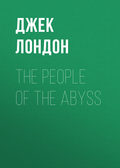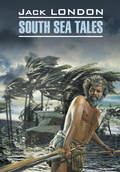
Джек Лондон
John Barleycorn
CHAPTER XXXVII
"Come," says the White Logic, "and forget these Asian dreamers of old time. Fill your glass and let us look at the parchments of the dreamers of yesterday who dreamed their dreams on your own warm hills."
I pore over the abstract of title of the vineyard called Tokay on the rancho called Petaluma. It is a sad long list of the names of men, beginning with Manuel Micheltoreno, one time Mexican "Governor, Commander-in-Chief, and Inspector of the Department of the Californias," who deeded ten square leagues of stolen Indian land to Colonel Don Mariano Guadalupe Vallejo for services rendered his country and for moneys paid by him for ten years to his soldiers.
Immediately this musty record of man's land lust assumes the formidableness of a battle-the quick struggling with the dust. There are deeds of trust, mortgages, certificates of release, transfers, judgments, foreclosures, writs of attachment, orders of sale, tax liens, petitions for letters of administration, and decrees of distribution. It is like a monster ever unsubdued, this stubborn land that drowses in this Indian summer weather and that survives them all, the men who scratched its surface and passed.
Who was this James King of William, so curiously named? The oldest surviving settler in the Valley of the Moon knows him not. Yet only sixty years ago he loaned Mariano G. Vallejo eighteen thousand dollars on security of certain lands including the vineyard yet to be and to be called Tokay. Whence came Peter O'Connor, and whither vanished, after writing his little name of a day on the woodland that was to become a vineyard? Appears Louis Csomortanyi, a name to conjure with. He lasts through several pages of this record of the enduring soil.
Comes old American stock, thirsting across the Great American Desert, mule-backing across the Isthmus, wind-jamming around the Horn, to write brief and forgotten names where ten thousand generations of wild Indians are equally forgotten-names like Halleck, Hastings, Swett, Tait, Denman, Tracy, Grimwood, Carlton, Temple. There are no names like those to-day in the Valley of the Moon.
The names begin to appear fast and furiously, flashing from legal page to legal page and in a flash vanishing. But ever the persistent soil remains for others to scrawl themselves across. Come the names of men of whom I have vaguely heard but whom I have never known. Kohler and Frohling-who built the great stone winery on the vineyard called Tokay, but who built upon a hill up which other vineyardists refused to haul their grapes. So Kohler and Frohling lost the land; the earthquake of 1906 threw down the winery; and I now live in its ruins.
La Motte-he broke the soil, planted vines and orchards, instituted commercial fish culture, built a mansion renowned in its day, was defeated by the soil, and passed. And my name of a day appears. On the site of his orchards and vine-yards, of his proud mansion, of his very fish ponds, I have scrawled myself with half a hundred thousand eucalyptus trees.
Cooper and Greenlaw-on what is called the Hill Ranch they left two of their dead, "Little Lillie" and "Little David," who rest to-day inside a tiny square of hand-hewn palings. Also, Gooper and Greenlaw in their time cleared the virgin forest from three fields of forty acres. To-day I have those three fields sown with Canada peas, and in the spring they shall be ploughed under for green manure.
Haska-a dim legendary figure of a generation ago, who went back up the mountain and cleared six acres of brush in the tiny valley that took his name. He broke the soil, reared stone walls and a house, and planted apple trees. And already the site of the house is undiscoverable, the location of the stone walls may be deduced from the configuration of the landscape, and I am renewing the battle, putting in angora goats to browse away the brush that has overrun Haska's clearing and choked Haska's apple trees to death. So I, too, scratch the land with my brief endeavour and flash my name across a page of legal script ere I pass and the page grows musty.
"Dreamers and ghosts," the White Logic chuckles.
"But surely the striving was not altogether vain," I contend.
"It was based on illusion and is a lie."
"A vital lie," I retort.
"And pray what is a vital lie but a lie?" the White Logic challenges. "Come. Fill your glass and let us examine these vital liars who crowd your bookshelves. Let us dabble in William James a bit."
"A man of health," I say. "From him we may expect no philosopher's stone, but at least we will find a few robust tonic things to which to tie."
"Rationality gelded to sentiment," the White Logic grins. "At the end of all his thinking he still clung to the sentiment of immortality. Facts transmuted in the alembic of hope into terms of faith. The ripest fruit of reason the stultification of reason. From the topmost peak of reason James teaches to cease reasoning and to have faith that all is well and will be well-the old, oh, ancient old, acrobatic flip of the metaphysicians whereby they reasoned reason quite away in order to escape the pessimism consequent upon the grim and honest exercise of reason.
"Is this flesh of yours you? Or is it an extraneous something possessed by you? Your body-what is it? A machine for converting stimuli into reactions. Stimuli and reactions are remembered. They constitute experience. Then you are in your consciousness these experiences. You are at any moment what you are thinking at that moment. Your I is both subject and object; it predicates things of itself and is the things predicated. The thinker is the thought, the knower is what is known, the possessor is the things possessed.
"After all, as you know well, man is a flux of states of consciousness, a flow of passing thoughts, each thought of self another self, a myriad thoughts, a myriad selves, a continual becoming but never being, a will-of-the-wisp flitting of ghosts in ghostland. But this, man will not accept of himself. He refuses to accept his own passing. He will not pass. He will live again if he has to die to do it.
"He shuffles atoms and jets of light, remotest nebulae, drips of water, prick-points of sensation, slime-oozings and cosmic bulks, all mixed with pearls of faith, love of woman, imagined dignities, frightened surmises, and pompous arrogances, and of the stuff builds himself an immortality to startle the heavens and baffle the immensities. He squirms on his dunghill, and like a child lost in the dark among goblins, calls to the gods that he is their younger brother, a prisoner of the quick that is destined to be as free as they-monuments of egotism reared by the epiphenomena; dreams and the dust of dreams, that vanish when the dreamer vanishes and are no more when he is not.
"It is nothing new, these vital lies men tell themselves, muttering and mumbling them like charms and incantations against the powers of Night. The voodoos and medicine men and the devil-devil doctors were the fathers of metaphysics. Night and the Noseless One were ogres that beset the way of light and life. And the metaphysicians would win by if they had to tell lies to do it. They were vexed by the brazen law of the Ecclesiast that men die like the beasts of the field and their end is the same. Their creeds were their schemes, their religions their nostrums, their philosophies their devices, by which they half-believed they would outwit the Noseless One and the Night.
"Bog-lights, vapours of mysticism, psychic overtones, soul orgies, wailings among the shadows, weird gnosticisms, veils and tissues of words, gibbering subjectivisms, gropings and maunderings, ontological fantasies, pan-psychic hallucinations-this is the stuff, the phantasms of hope, that fills your bookshelves. Look at them, all the sad wraiths of sad mad men and passionate rebels-your Schopenhauers, your Strindbergs, your Tolstois and Nietzsches.
"Come. Your glass is empty. Fill and forget."
I obey, for my brain is now well a-crawl with the maggots of alcohol, and as I drink to the sad thinkers on my shelves I quote Richard Hovey:
"Abstain not! Life and Love like night and day
Offer themselves to us on their own terms,
Not ours. Accept their bounty while ye may,
Before we be accepted by the worms,"
"I will cap you," cries the White Logic.
"No," I answer, while the maggots madden me. "I know you for what you are, and I am unafraid. Under your mask of hedonism you are yourself the Noseless One and your way leads to the Night. Hedonism has no meaning. It, too, is a lie, at best the coward's smug compromise."
"Now will I cap you!" the White Logic breaks in.
"But if you would not this poor life fulfil,
Lo, you are free to end it when you will,
Without the fear of waking after death."
And I laugh my defiance; for now, and for the moment, I know the White Logic to be the arch-impostor of them all, whispering his whispers of death. And he is guilty of his own unmasking, with his own genial chemistry turning the tables on himself, with his own maggots biting alive the old illusions, resurrecting and making to sound again the old voice from beyond of my youth, telling me again that still are mine the possibilities and powers which life and the books had taught me did not exist.
And the dinner gong sounds to the reversed bottom of my glass. Jeering at the White Logic, I go out to join my guests at table, and with assumed seriousness to discuss the current magazines and the silly doings of the world's day, whipping every trick and ruse of controversy through all the paces of paradox and persiflage. And, when the whim changes, it is most easy and delightfully disconcerting to play with the respectable and cowardly bourgeois fetishes and to laugh and epigram at the flitting god-ghosts and the debaucheries and follies of wisdom.
The clown's the thing! The clown! If one must be a philosopher, let him be Aristophanes. And no one at the table thinks I am jingled. I am in fine fettle, that is all. I tire of the labour of thinking, and, when the table is finished, start practical jokes and set all playing at games, which we carry on with bucolic boisterousness.
And when the evening is over and good-night said, I go back through my book-walled den to my sleeping porch and to myself and to the White Logic which, undefeated, has never left me. And as I fall to fuddled sleep I hear youth crying, as Harry Kemp heard it:
"I heard Youth calling in the night:
'Gone is my former world-delight;
For there is naught my feet may stay;
The morn suffuses into day,
It dare not stand a moment still
But must the world with light fulfil.
More evanescent than the rose
My sudden rainbow comes and goes,
Plunging bright ends across the sky-
Yea, I am Youth because I die!'"
CHAPTER XXXVIII
The foregoing is a sample roaming with the White Logic through the dusk of my soul.
To the best of my power I have striven to give the reader a glimpse of a man's secret dwelling when it is shared with John Barleycorn. And the reader must remember that this mood, which he has read in a quarter of an hour, is but one mood of the myriad moods of John Barleycorn, and that the procession of such moods may well last the clock around through many a day and week and month.
My alcoholic reminiscences draw to a close. I can say, as any strong, chesty drinker can say, that all that leaves me alive to-day on the planet is my unmerited luck-the luck of chest, and shoulders, and constitution. I dare to say that a not large percentage of youths, in the formative stage of fifteen to seventeen, could have survived the stress of heavy drinking that I survived between my fifteenth and seventeenth years; that a not large percentage of men could have punished the alcohol I have punished in my manhood years and lived to tell the tale. I survived, through no personal virtue, but because I did not have the chemistry of a dipsomaniac and because I possessed an organism unusually resistant to the ravages of John Barleycorn. And, surviving, I have watched the others die, not so lucky, down all the long sad road.
It was my unmitigated and absolute good fortune, good luck, chance, call it what you will, that brought me through the fires of John Barleycorn. My life, my career, my joy in living, have not been destroyed. They have been scorched, it is true; like the survivors of forlorn hopes, they have by unthinkably miraculous ways come through the fight to marvel at the tally of the slain.
And like such a survivor of old red war who cries out, "Let there be no more war!" so I cry out, "Let there be no more poison-fighting by our youths!" The way to stop war is to stop it. The way to stop drinking is to stop it. The way China stopped the general use of opium was by stopping the cultivation and importation of opium. The philosophers, priests, and doctors of China could have preached themselves breathless against opium for a thousand years, and the use of opium, so long as opium was ever accessible and obtainable, would have continued unabated. We are so made, that is all.
We have with great success made a practice of not leaving arsenic and strychnine, and typhoid and tuberculosis germs lying around for our children to be destroyed by. Treat John Barleycorn the same way. Stop him. Don't let him lie around, licensed and legal, to pounce upon our youth. Not of alcoholics nor for alcoholics do I write, but for our youths, for those who possess no more than the adventure-stings and the genial predispositions, the social man-impulses, which are twisted all awry by our barbarian civilisation which feeds them poison on all the corners. It is the healthy, normal boys, now born or being born, for whom I write.
It was for this reason, more than any other, and more ardently than any other, that I rode down into the Valley of the Moon, all a-jingle, and voted for equal suffrage. I voted that women might vote, because I knew that they, the wives and mothers of the race, would vote John Barleycorn out of existence and back into the historical limbo of our vanished customs of savagery. If I thus seem to cry out as one hurt, please remember that I have been sorely bruised and that I do dislike the thought that any son or daughter of mine or yours should be similarly bruised.
The women are the true conservators of the race. The men are the wastrels, the adventure-lovers and gamblers, and in the end it is by their women that they are saved. About man's first experiment in chemistry was the making of alcohol, and down all the generations to this day man has continued to manufacture and drink it. And there has never been a day when the women have not resented man's use of alcohol, though they have never had the power to give weight to their resentment. The moment women get the vote in any community, the first thing they proceed to do is to close the saloons. In a thousand generations to come men of themselves will not close the saloons. As well expect the morphine victims to legislate the sale of morphine out of existence.
The women know. They have paid an incalculable price of sweat and tears for man's use of alcohol. Ever jealous for the race, they will legislate for the babes of boys yet to be born; and for the babes of girls, too, for they must be the mothers, wives, and sisters of these boys.
And it will be easy. The only ones that will be hurt will be the topers and seasoned drinkers of a single generation. I am one of these, and I make solemn assurance, based upon long traffic with John Barleycorn, that it won't hurt me very much to stop drinking when no one else drinks and when no drink is obtainable. On the other hand, the overwhelming proportion of young men are so normally non-alcoholic, that, never having had access to alcohol, they will never miss it. They will know of the saloon only in the pages of history, and they will think of the saloon as a quaint old custom similar to bull-baiting and the burning of witches.
CHAPTER XXXIX
Of course, no personal tale is complete without bringing the narrative of the person down to the last moment. But mine is no tale of a reformed drunkard. I was never a drunkard, and I have not reformed.
It chanced, some time ago, that I made a voyage of one hundred and forty-eight days in a windjammer around the Horn. I took no private supply of alcohol along, and, though there was no day of those one hundred and forty-eight days that I could not have got a drink from the captain, I did not take a drink. I did not take a drink because I did not desire a drink. No one else drank on board. The atmosphere for drinking was not present, and in my system there was no organic need for alcohol. My chemistry did not demand alcohol.
So there arose before me a problem, a clear and simple problem: THIS IS SO EASY, WHY NOT KEEP IT UP WHEN YOU GET BACK ON LAND? I weighed this problem carefully. I weighed it for five months, in a state of absolute non-contact with alcohol. And out of the data of past experience, I reached certain conclusions.
In the first place, I am convinced that not one man in ten thousand or in a hundred thousand is a genuine, chemical dipsomaniac. Drinking, as I deem it, is practically entirely a habit of mind. It is unlike tobacco, or cocaine, or morphine, or all the rest of the long list of drugs. The desire for alcohol is quite peculiarly mental in its origin. It is a matter of mental training and growth, and it is cultivated in social soil. Not one drinker in a million began drinking alone. All drinkers begin socially, and this drinking is accompanied by a thousand social connotations such as I have described out of my own experience in the first part of this narrative. These social connotations are the stuff of which the drink habit is largely composed. The part that alcohol itself plays is inconsiderable when compared with the part played by the social atmosphere in which it is drunk. The human is rarely born these days, who, without long training in the social associations of drinking, feels the irresistible chemical propulsion of his system toward alcohol. I do assume that such rare individuals are born, but I have never encountered one.
On this long, five-months' voyage, I found that among all my bodily needs not the slightest shred of a bodily need for alcohol existed. But this I did find: my need was mental and social. When I thought of alcohol, the connotation was fellowship. When I thought of fellowship, the connotation was alcohol. Fellowship and alcohol were Siamese twins. They always occurred linked together.
Thus, when reading in my deck chair or when talking with others, practically any mention of any part of the world I knew instantly aroused the connotation of drinking and good fellows. Big nights and days and moments, all purple passages and freedoms, thronged my memory. "Venice" stares at me from the printed page, and I remember the cafe tables on the sidewalks. "The Battle of Santiago," some one says, and I answer, "Yes, I've been over the ground." But I do not see the ground, nor Kettle Hill, nor the Peace Tree. What I see is the Cafe Venus, on the plaza of Santiago, where one hot night I drank and talked with a dying consumptive.
The East End of London, I read, or some one says; and first of all, under my eyelids, leap the visions of the shining pubs, and in my ears echo the calls for "two of bitter" and "three of Scotch." The Latin Quarter-at once I am in the student cabarets, bright faces and keen spirits around me, sipping cool, well-dripped absinthe while our voices mount and soar in Latin fashion as we settle God and art and democracy and the rest of the simple problems of existence.
In a pampero off the River Plate we speculate, if we are disabled, of running in to Buenos Ayres, the "Paris of America," and I have visions of bright congregating places of men, of the jollity of raised glasses, and of song and cheer and the hum of genial voices. When we have picked up the North-east Trades in the Pacific we try to persuade our dying captain to run for Honolulu, and while I persuade I see myself again drinking cocktails on the cool lanais and fizzes out at Waikiki where the surf rolls in. Some one mentions the way wild ducks are cooked in the restaurants of San Francisco, and at once I am transported to the light and clatter of many tables, where I gaze at old friends across the golden brims of long-stemmed Rhine-wine glasses.
And so I pondered my problem. I should not care to revisit all these fair places of the world except in the fashion I visited them before. GLASS IN HAND! There is a magic in the phrase. It means more than all the words in the dictionary can be made to mean. It is a habit of mind to which I have been trained all my life. It is now part of the stuff that composes me. I like the bubbling play of wit, the chesty laughs, the resonant voices of men, when, glass in hand, they shut the grey world outside and prod their brains with the fun and folly of an accelerated pulse.
No, I decided; I shall take my drink on occasion. With all the books on my shelves, with all the thoughts of the thinkers shaded by my particular temperament, I decided coolly and deliberately that I should continue to do what I had been trained to want to do. I would drink-but oh, more skilfully, more discreetly, than ever before. Never again would I be a peripatetic conflagration. Never again would I invoke the White Logic. I had learned how not to invoke him.
The White Logic now lies decently buried alongside the Long Sickness. Neither will afflict me again. It is many a year since I laid the Long Sickness away; his sleep is sound. And just as sound is the sleep of the White Logic. And yet, in conclusion, I can well say that I wish my forefathers had banished John Barleycorn before my time. I regret that John Barleycorn flourished everywhere in the system of society in which I was born, else I should not have made his acquaintance, and I was long trained in his acquaintance.







